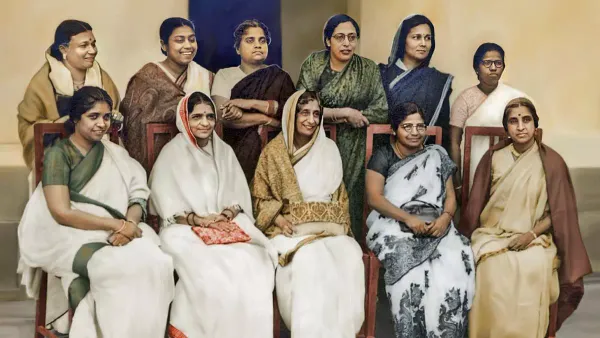Table of contents
Relevance to UPSC
- GS 1: Modern Indian History and Role of Women in Freedom Struggle and Constitution-making Process.
- GS 2: Indian Constitution and Governance: Foundational debates on social justice, gender equality, and Uniform Civil Code during constitution-making.
- GS Paper 4: Ethics, Integrity, and Aptitude: Reflects on ethical challenges faced by women in leadership and their contributions to inclusive governance.
- Essay Paper: Offers insights for topics on gender equality, social justice, and democratic ideals.
Introduction
On Constitution Day (November 26), President Droupadi Murmu paid homage to the contributions of women members in the Constituent Assembly. The Indian Constitution, one of the most progressive and inclusive documents of its time, had inputs from 15 visionary women who represented diverse backgrounds and ideologies. These women, while fewer in number, made significant contributions to debates on gender, caste, and social justice, leaving an indelible mark on the framework of modern India.
News Article
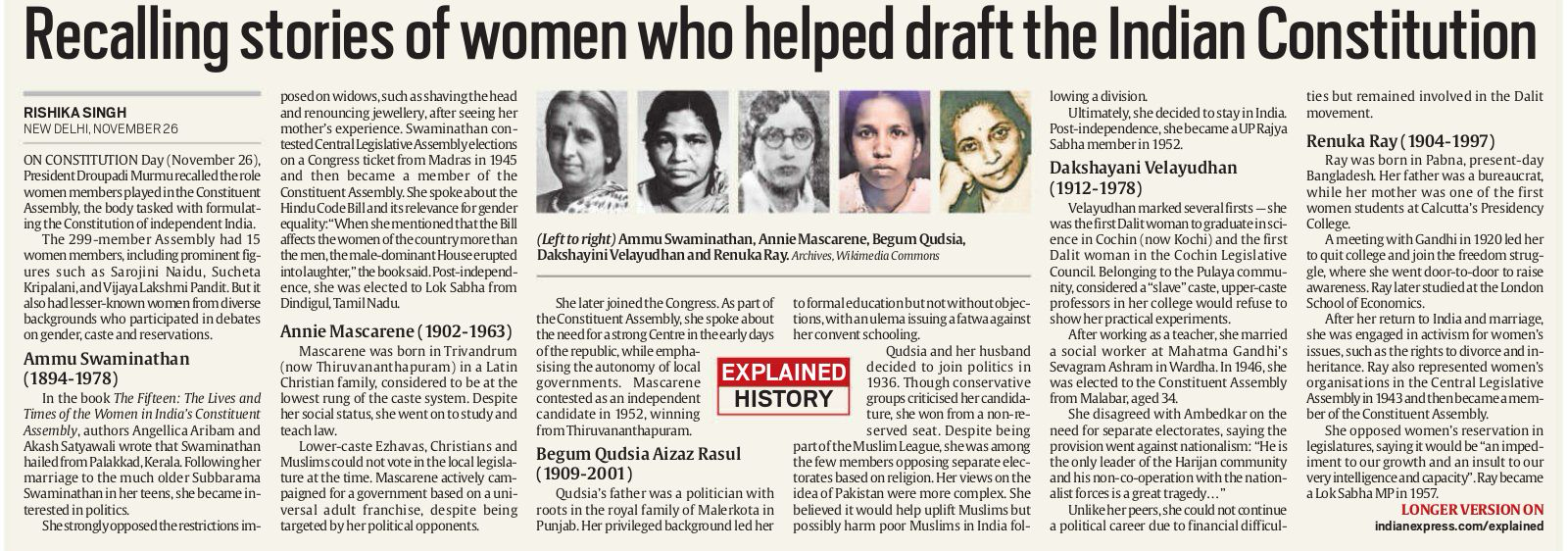
Below is a profile of these remarkable women whose contributions continue to inspire generations:
1. Sucheta Kriplani
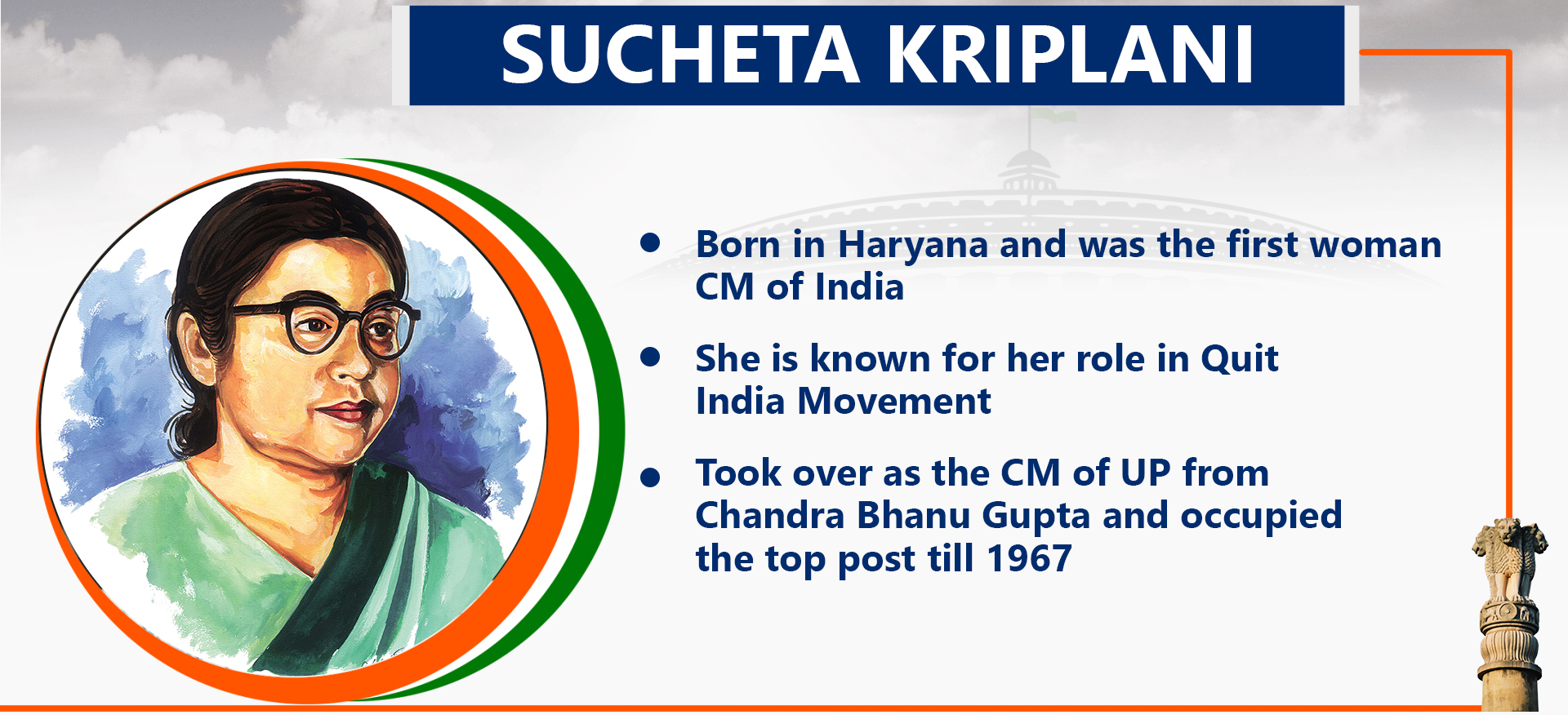
- Key Contributions:
- Born in Haryana, Sucheta Kriplani was a prominent figure in the Quit India Movement.
- She later became the first woman Chief Minister of India, serving Uttar Pradesh from 1963 to 1967.
- In the Constituent Assembly, she actively participated in debates on women's rights and social justice.
2. Ammu Swaminathan (1894–1978)
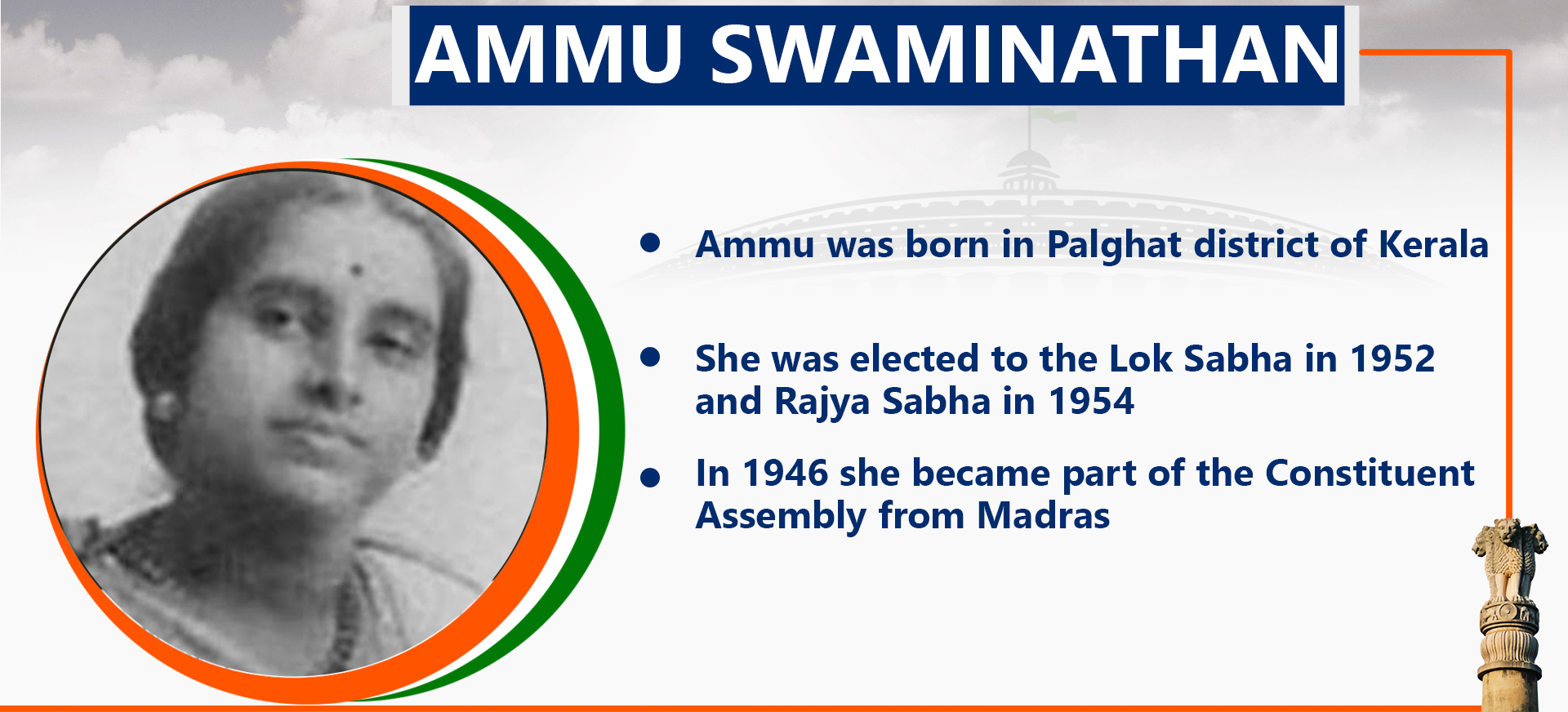
- Background:
- Hailing from Palakkad, Kerala, Ammu Swaminathan married the much older Subbarama Swaminathan at a young age.
- Despite the restrictive societal norms imposed on women, she emerged as a vocal advocate for gender equality and education.
- Contributions:
- Contested in the 1945 Legislative Assembly elections from Madras and became a member of the Constituent Assembly.
- Advocated for women's rights and reservations and spoke about the importance of gender equality in governance.
- Post-independence, she was elected to the Lok Sabha from Dindigul, Tamil Nadu.
3. Annie Mascarene (1902–1963)
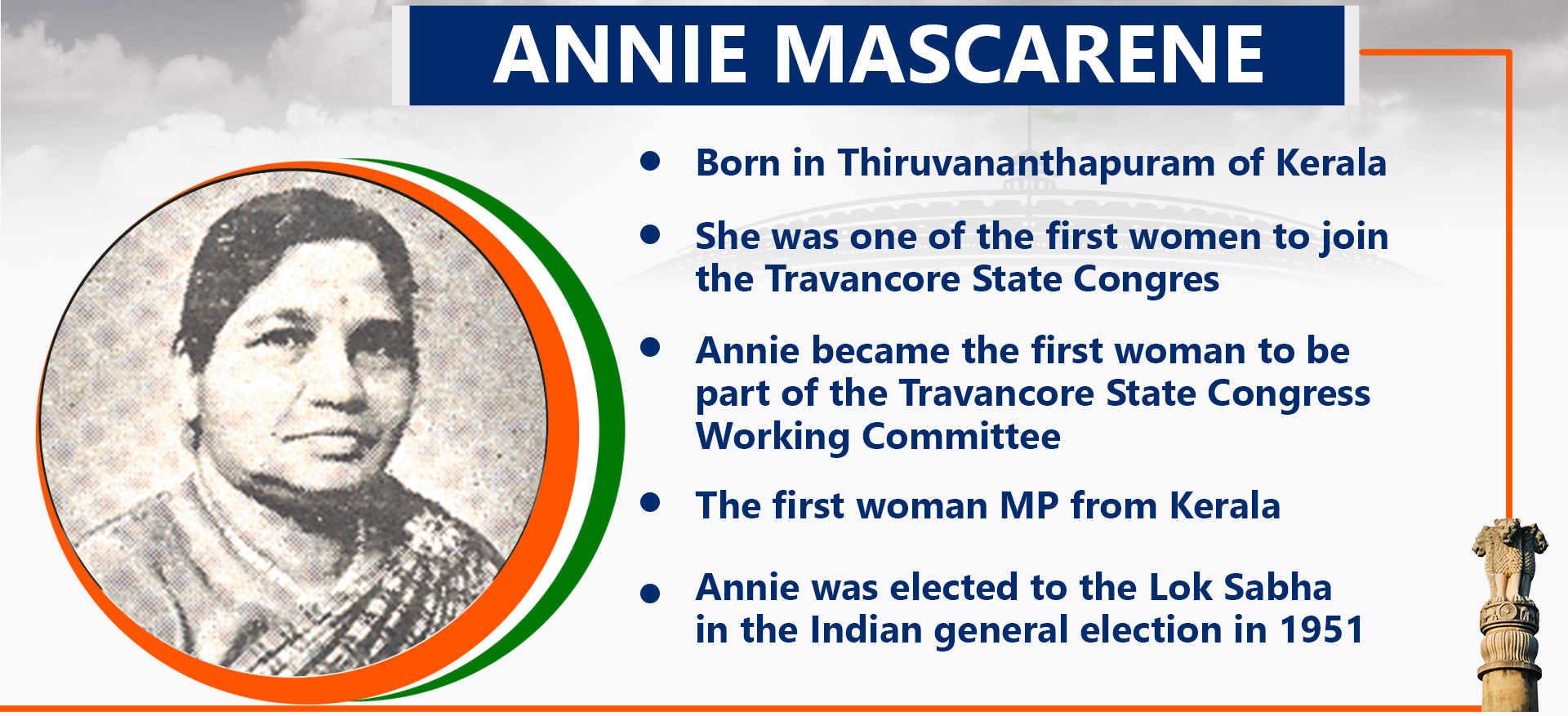
- Background:
- Born in Trivandrum (now Thiruvananthapuram), Annie Mascarene hailed from a Latin Christian family.
- Overcame the caste and gender barriers of her time, becoming one of the early women leaders in Indian politics.
- Contributions:
- Staunchly advocated for local governance and autonomy in the Constituent Assembly.
- Emphasized the need for strong grassroots structures to strengthen India’s democracy.
- Continued her political career by contesting as an independent candidate in 1952.
4. Begum Qudsia Aizaz Rasul (1909–2001)
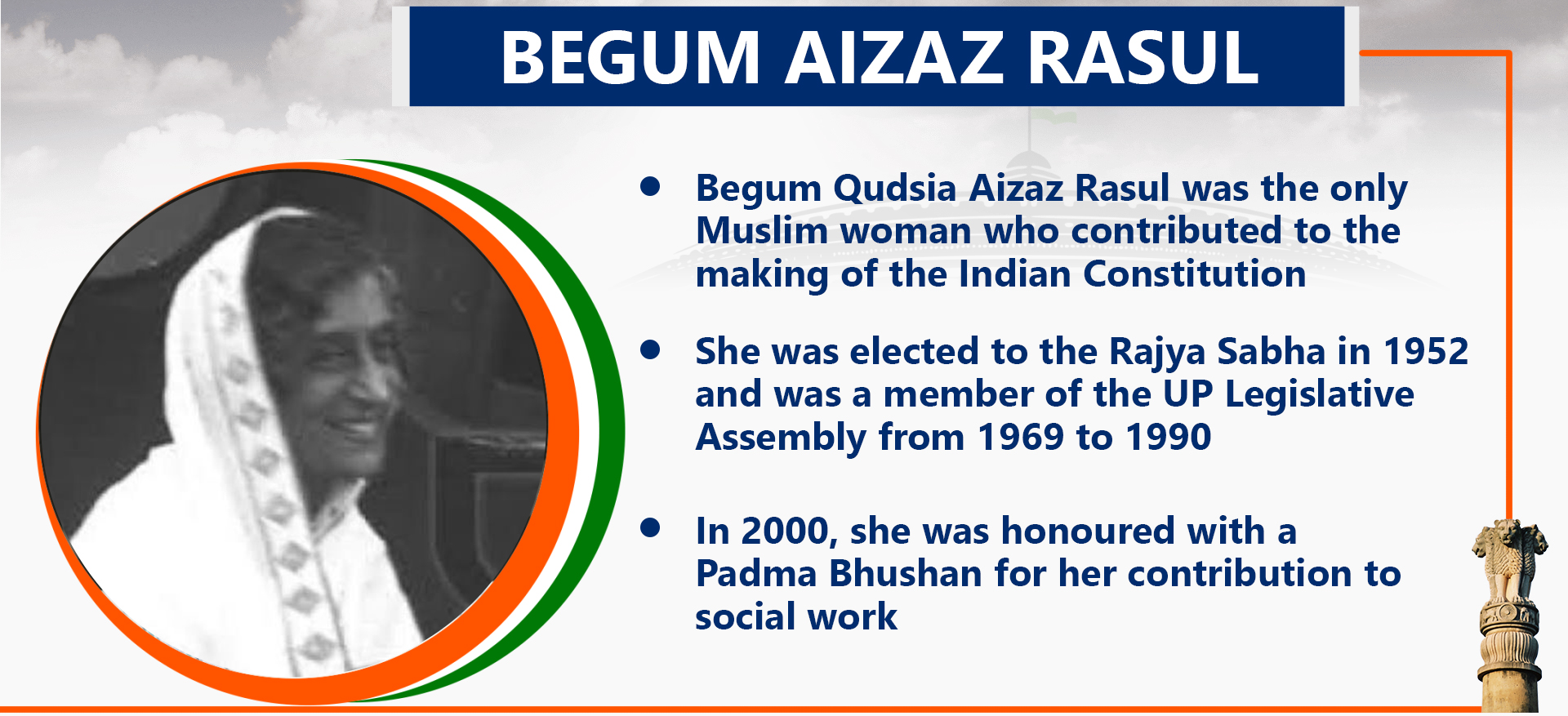
- Background:
- Belonged to a prominent political family with deep roots in Punjab.
- Despite opposition from conservative groups, she pursued education and actively participated in politics.
- Contributions:
- Represented the Muslim League in the Constituent Assembly and was the only woman from the party.
- Opposed the creation of separate electorates for Muslims, advocating for national unity over communal divisions.
- Her nuanced understanding of Muslim representation helped shape India’s policies on minority rights.
5. Dakshayani Velayudhan (1912–1978)
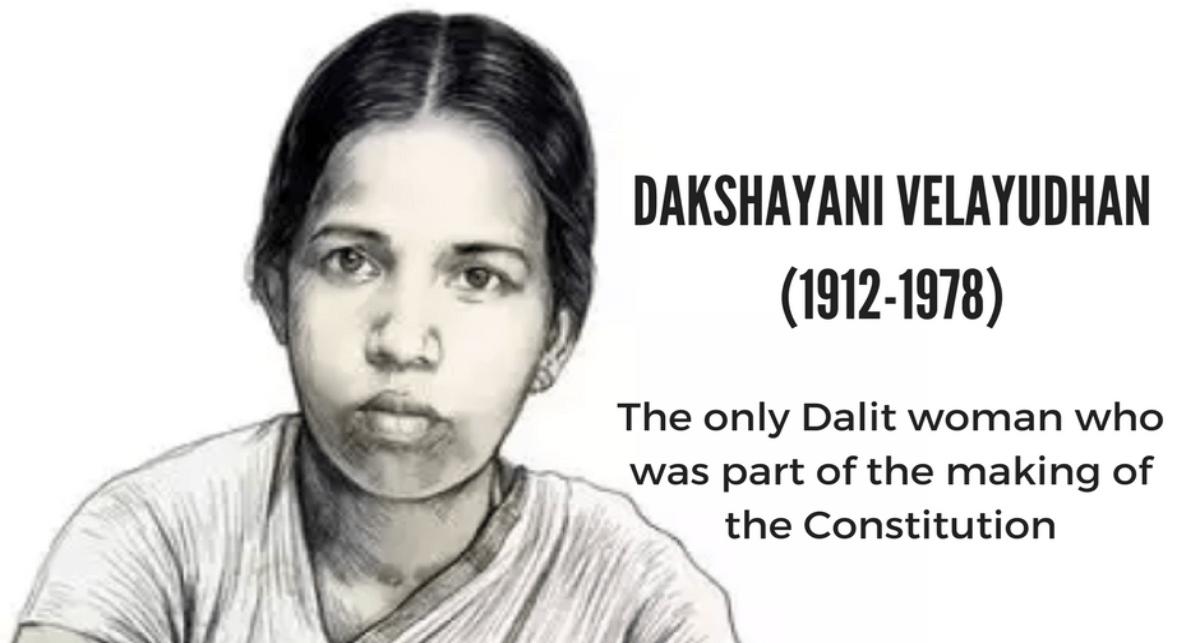
- Background:
- The first Dalit woman graduate in India and the only Dalit woman in the Constituent Assembly.
- Belonged to the Pulaya community in Kerala, which was then considered a “slave caste.”
- Contributions:
- Actively worked to address caste inequalities, criticizing the separate electorate provision for Dalits, as proposed by some leaders.
- Her vision emphasized unity within the Dalit community and the need for inclusive policies that uplift marginalized sections.
- Remained involved in the Dalit movement post-independence and served as a Rajya Sabha member in 1952.
6. Renuka Ray (1904–1997)
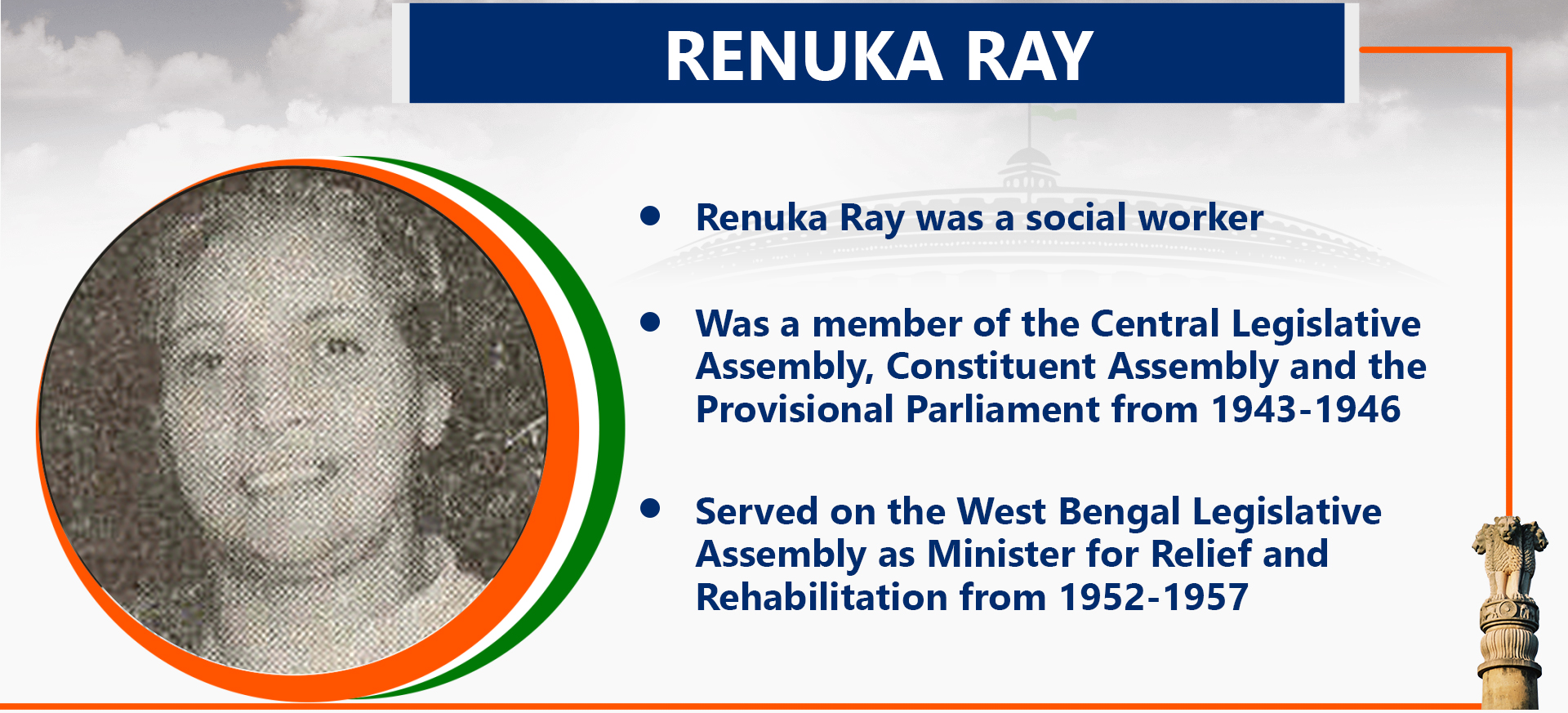
- Background:
- Born in Pabna, present-day Bangladesh, into a bureaucratic family. Her mother was among the first women students at Calcutta’s Presidency College.
- Educated in London, she returned to India to join the freedom struggle.
- Contributions:
- Advocated for women’s rights in inheritance laws and reforms in divorce and marriage laws.
- Opposed women’s reservation in legislatures, viewing it as a “constraint on gender equality and capacity.”
- Became a Lok Sabha MP in 1957, continuing her work on social justice and gender equity.
7. Sarojini Naidu
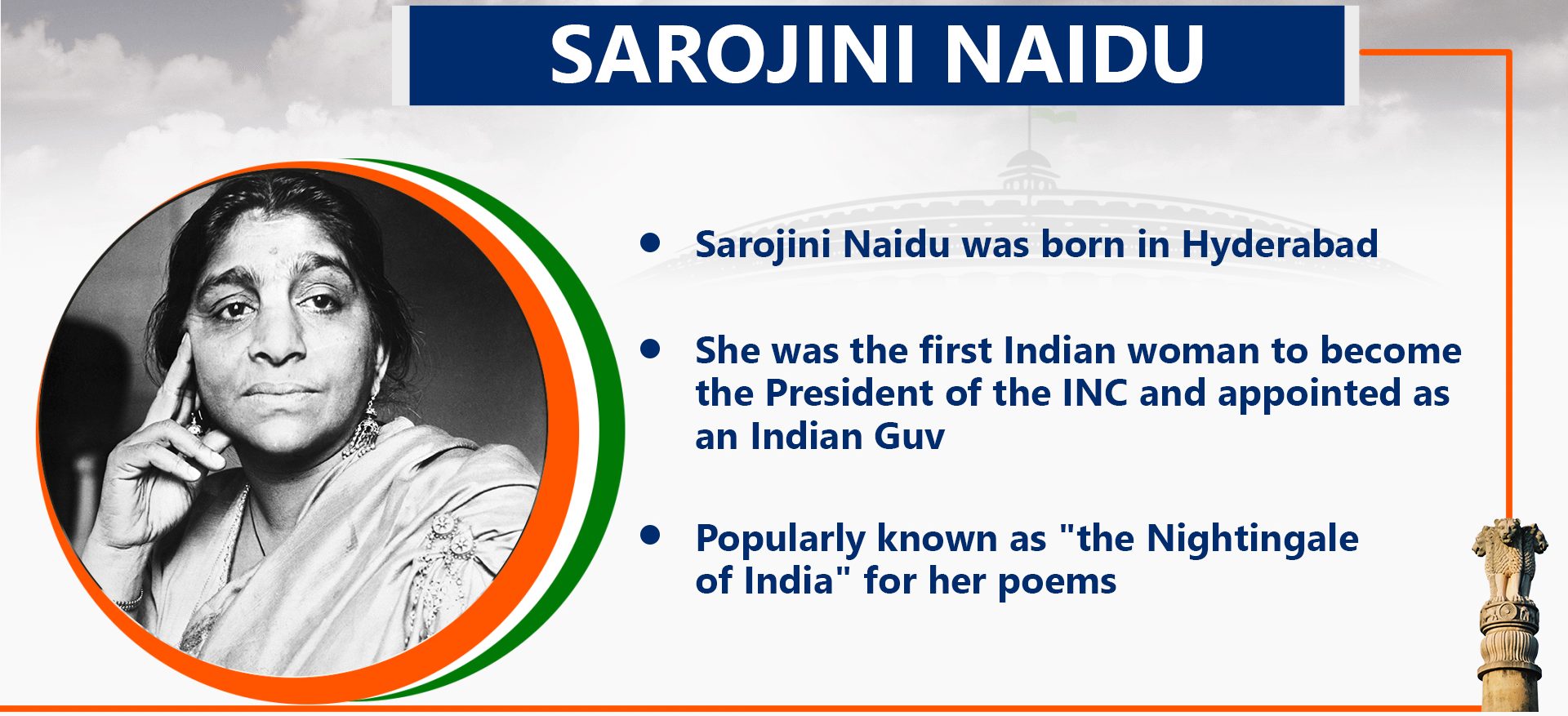
- Key Contributions:
- Known as the "Nightingale of India", Sarojini Naidu was the first Indian woman to become the President of the Indian National Congress and later the Governor of Uttar Pradesh.
- She was a powerful orator and poet who represented India at various international platforms.
- Her contributions to the Assembly focused on promoting equality, education, and women's rights.
8. Vijaya Lakshmi Pandit
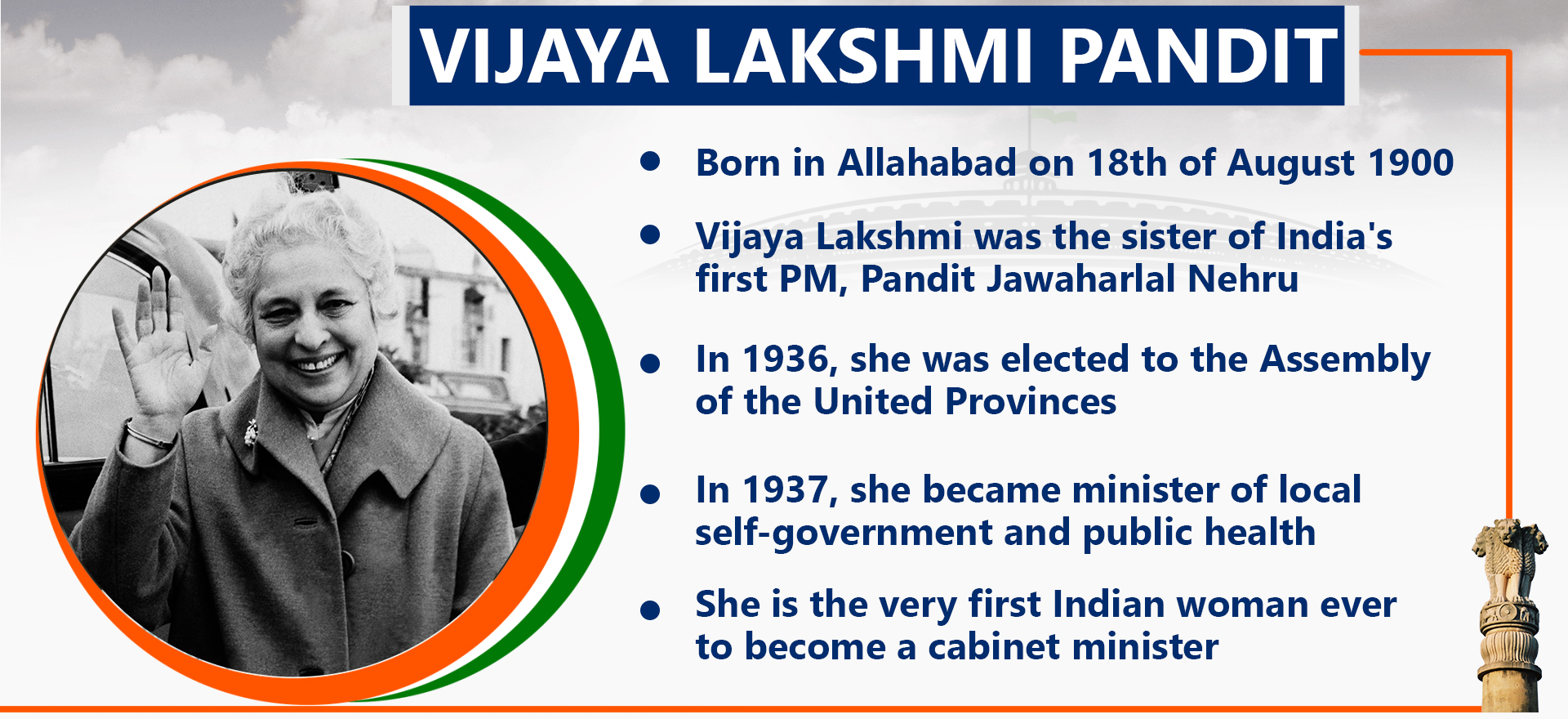
- Key Contributions:
- The sister of Jawaharlal Nehru, Pandit was a pioneer in women's political representation.
- She was the first Indian woman cabinet minister during British rule and later the first woman President of the UN General Assembly (1953).
- Her focus in the Assembly was on global diplomacy and the responsibilities of a free India.
9. Durgabai Deshmukh
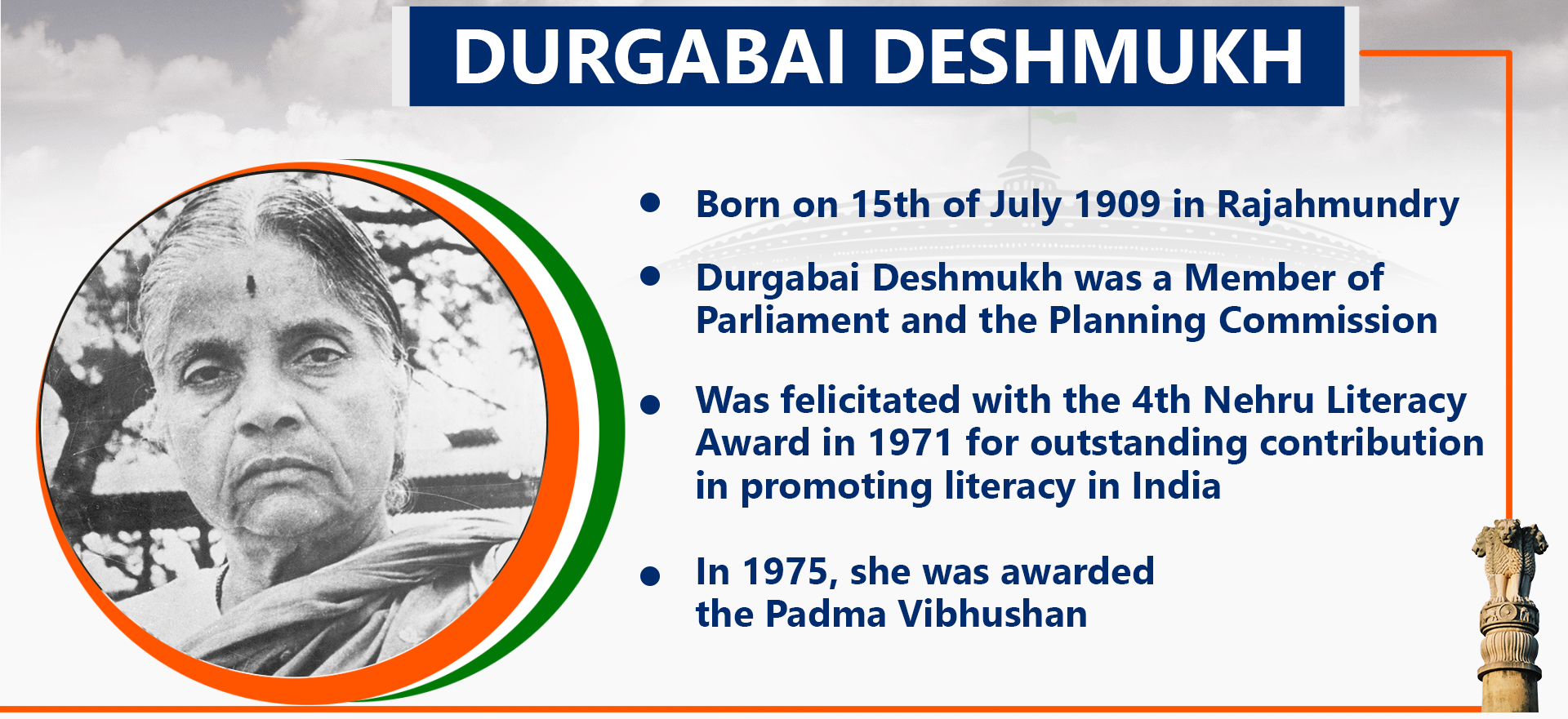
- Background: Known as the "Mother of Social Work," she championed education and welfare.
- Key Contributions:
- Advocated for lowering the age of eligibility for holding a ministerial position from 35 to 30.
- Established the Andhra Mahila Sabha to promote women's education and welfare.
- Later chaired the Central Social Welfare Board and contributed to the Planning Commission.
10. Rajkumari Amrit Kaur
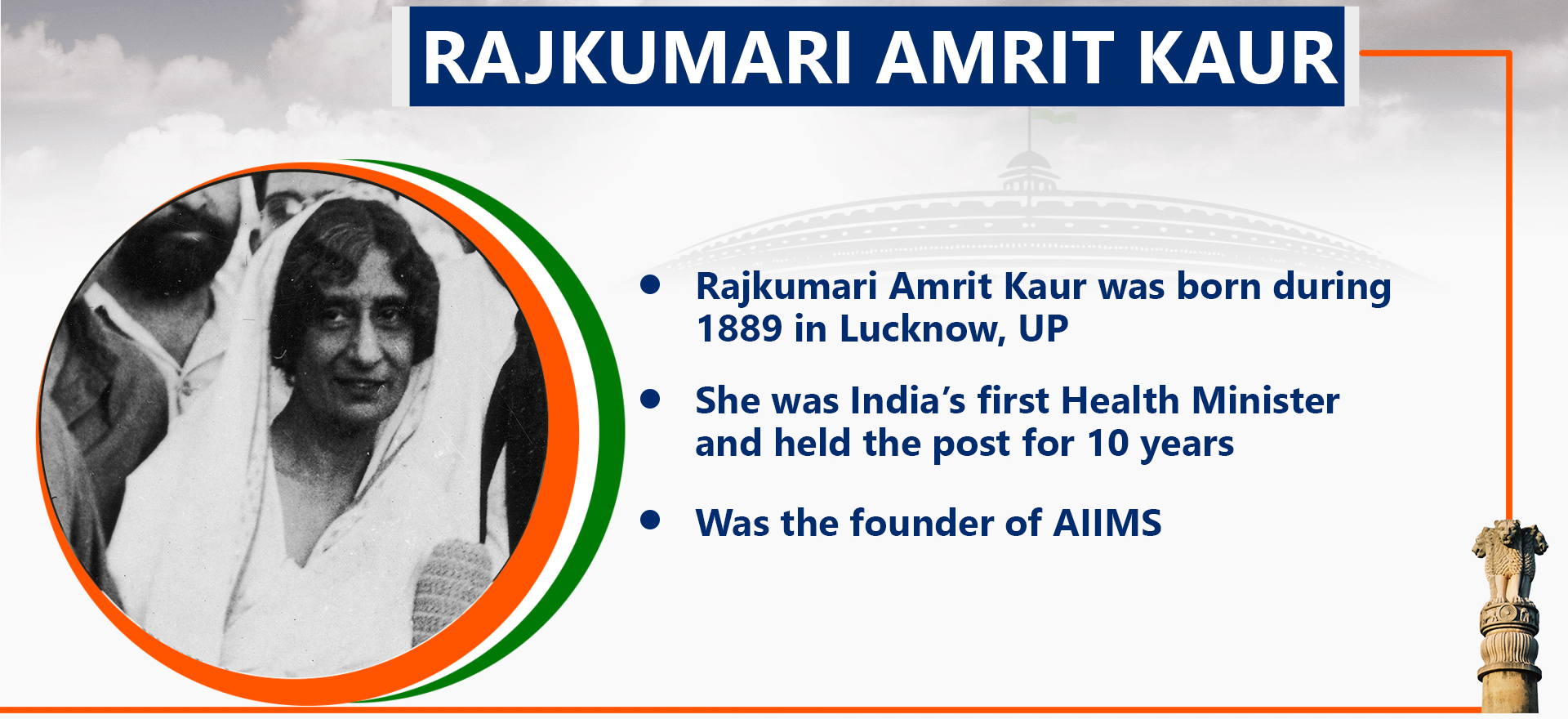
- Background: A princess-turned-activist who played a significant role in the freedom struggle.
- Key Contributions:
- Advocated for universal adult franchise and opposed reservations for women.
- Promoted the Uniform Civil Code and pushed for replacing "free practice of religion" with "freedom of religious worship" in the Constitution.
- India’s first Health Minister, founded AIIMS, and prioritized women’s health and education.
11. Hansa Jivraj Mehta
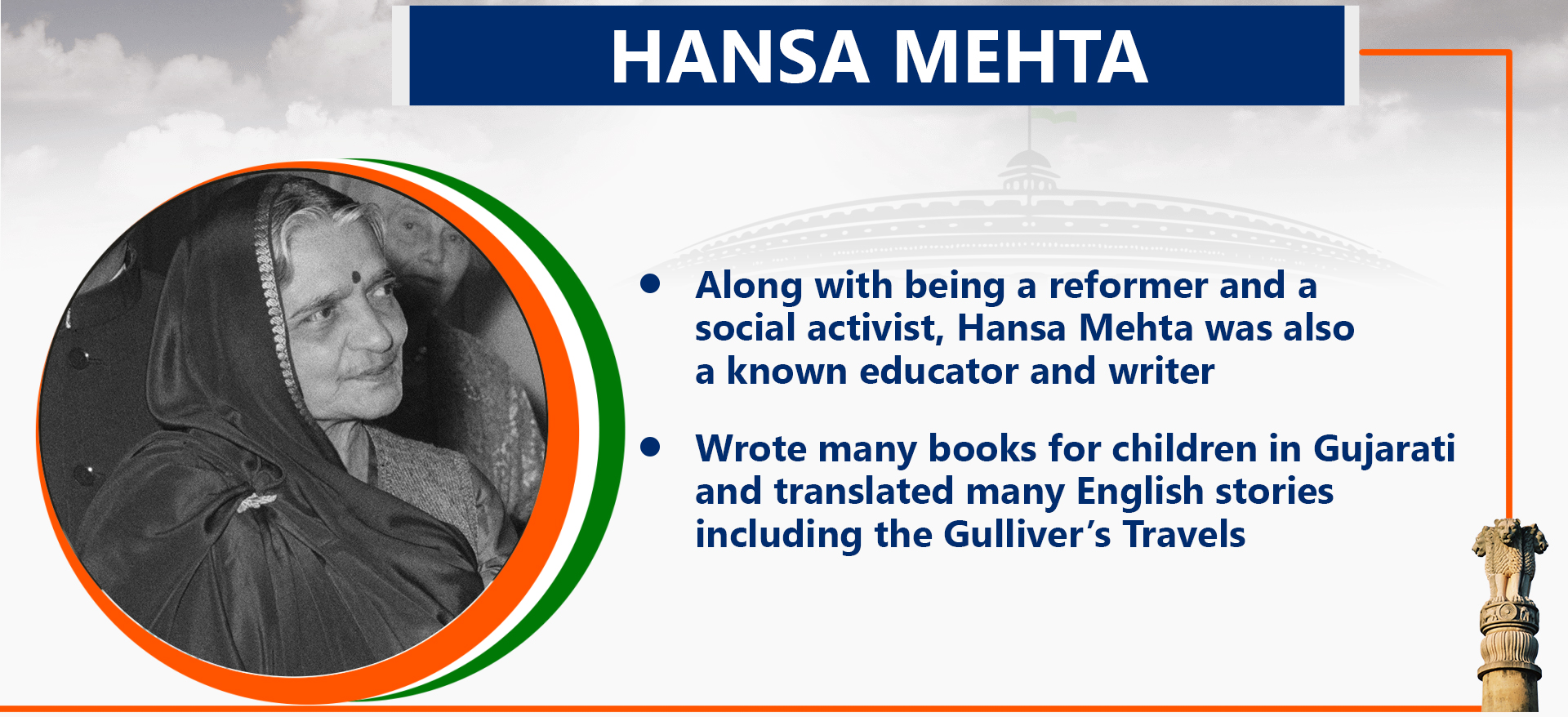
- Background: Freedom fighter, women’s rights activist, and Vice Chancellor of MS University, Baroda.
- Key Contributions:
- Presented India’s first national flag on behalf of Indian women during Independence.
- Opposed reservations for women, demanding social, economic, and political justice instead of quotas.
- Championed gender-neutral terminology in the Universal Declaration of Human Rights while serving on UNESCO's board.
12. Malati Choudhury
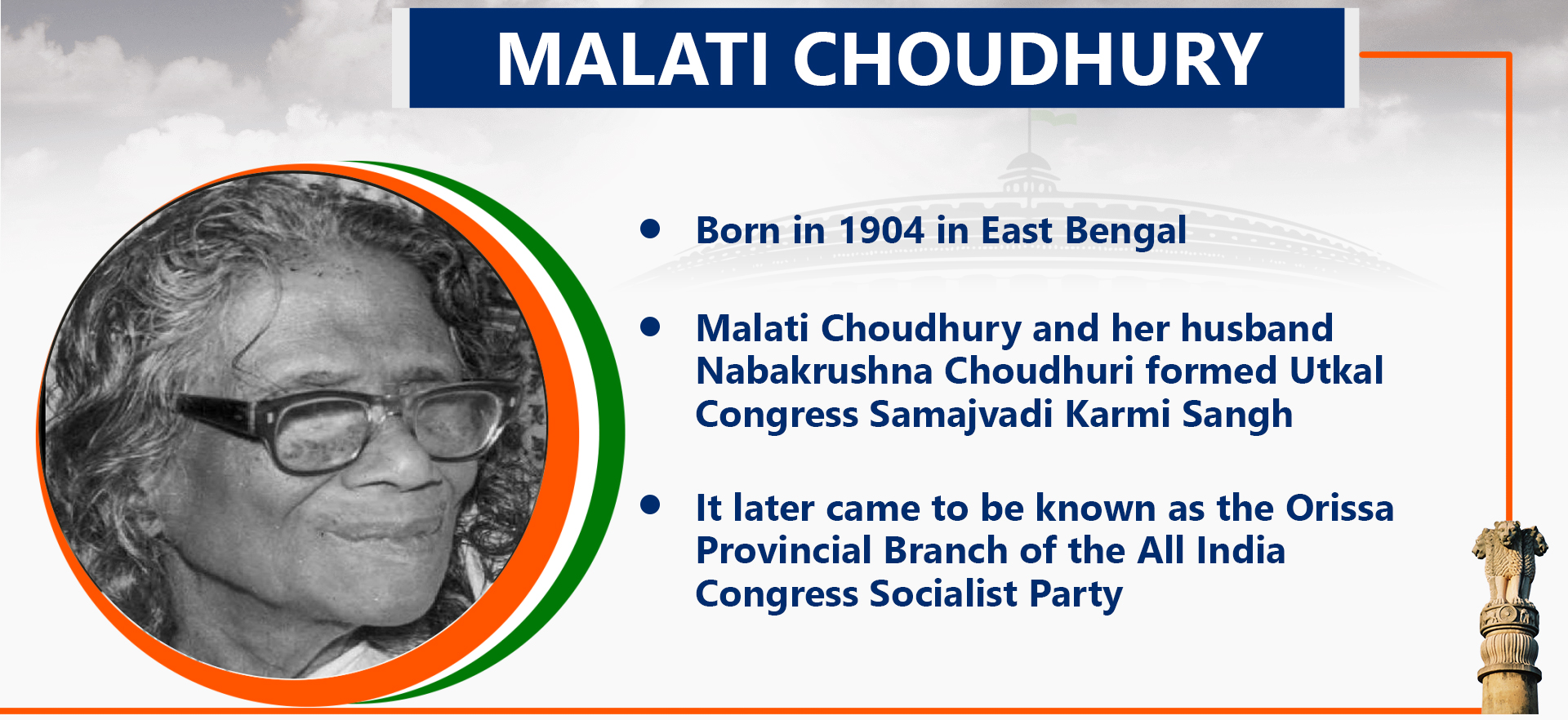
- Key Contributions:
- Born in East Bengal (now Bangladesh), Choudhury was an advocate for socialist ideals and grassroots movements.
- She and her husband founded the Utkal Congress Samajvadi Karmi Sangh, which later became part of the Congress Socialist Party.
- In the Assembly, she focused on education reform and upliftment of marginalized communities.
13. Kamla Chaudhry
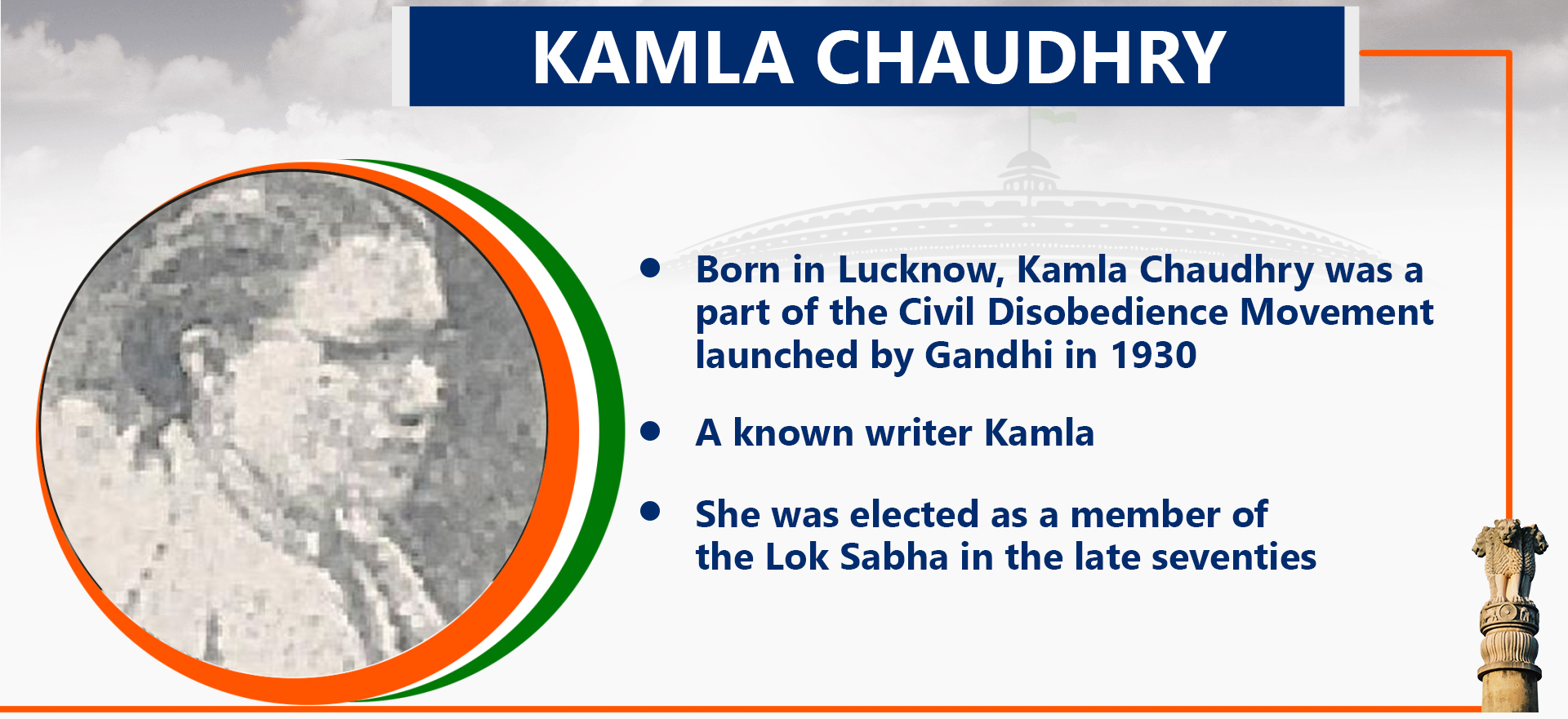
- Key Contributions:
- A noted writer and freedom fighter from Lucknow, she was actively involved in the Civil Disobedience Movement.
- Her literary works often highlighted social issues and women’s struggles.
- As a Constituent Assembly member, she pushed for gender equality and social reforms.
14. Purnima Banerjee
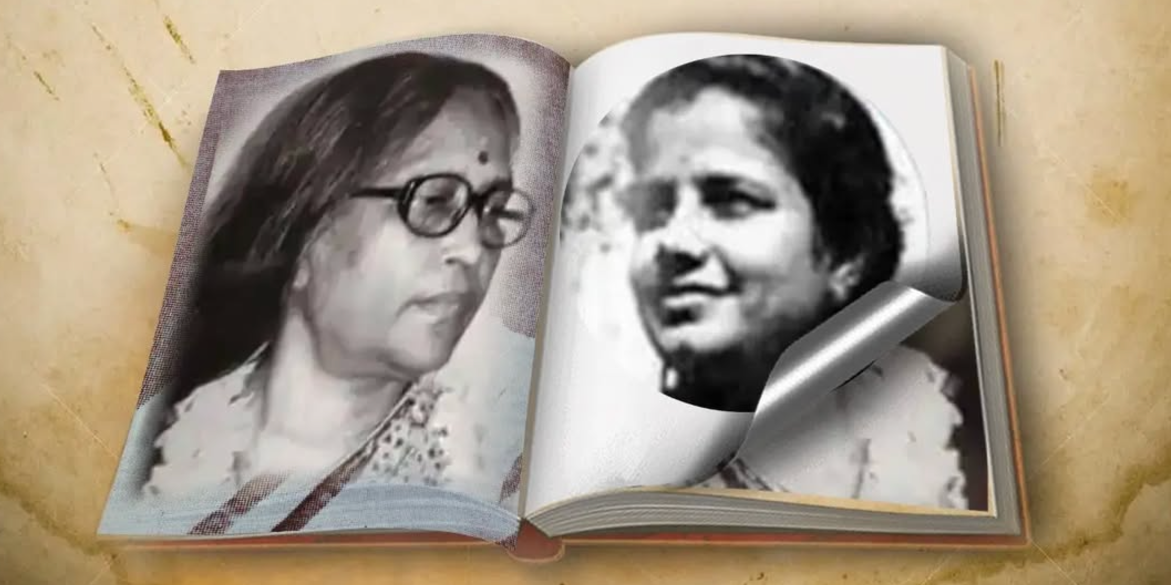
- Key Contributions:
- A secretary of the Indian National Congress committee in Allahabad, Banerjee was at the forefront of the freedom struggle.
- She worked on issues related to labor rights, education reform, and women's empowerment.
- Banerjee played a key role in advocating for universal suffrage and inclusive governance.
15. Leela Roy
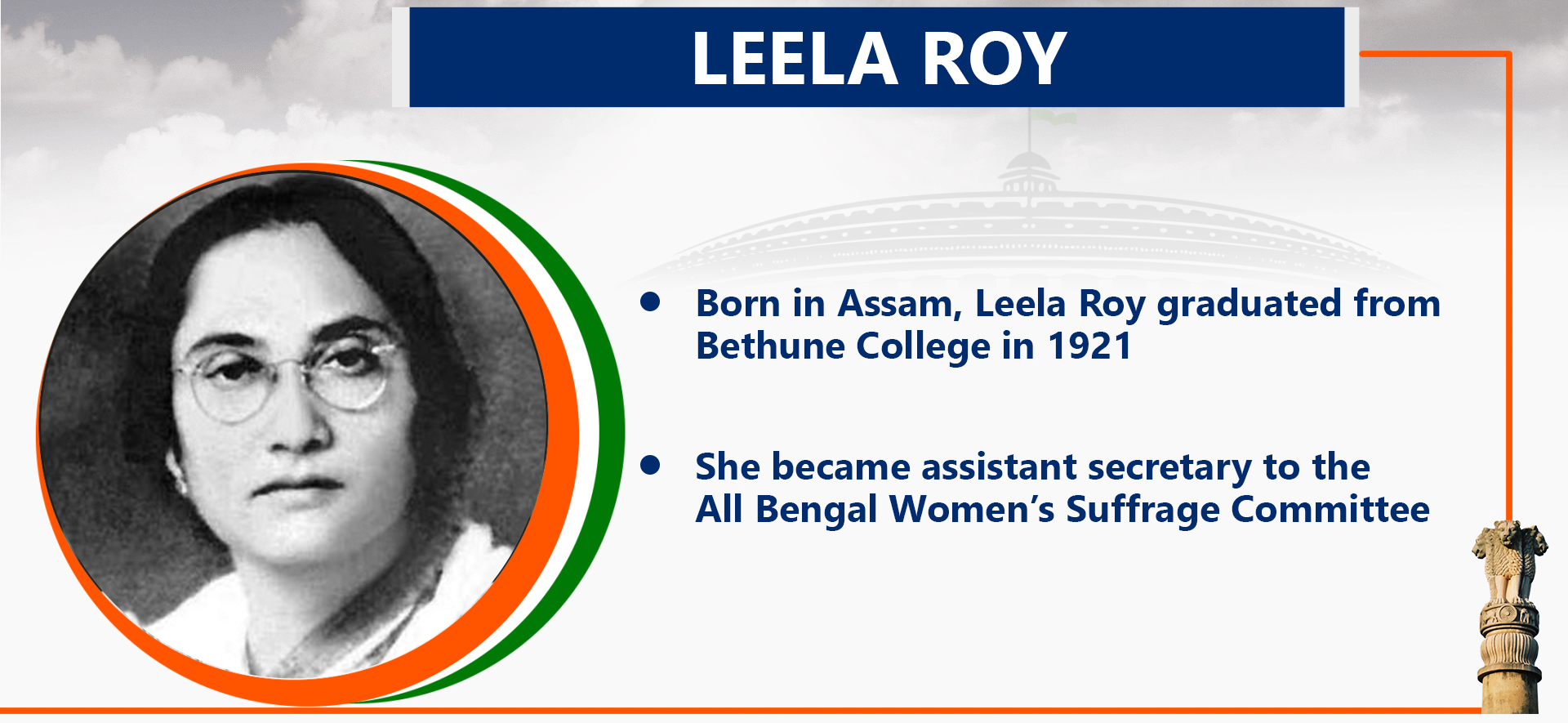
- Key Contributions:
- Born in Assam, Leela Roy was a feminist and social reformer who actively worked for women’s suffrage.
- A close associate of Subhas Chandra Bose, she was a fierce critic of gender inequality in political representation.
- Roy’s efforts in the Assembly revolved around education for women and grassroots empowerment.

The Hindu Code Bill: A Landmark Fight
The Hindu Code Bill, aimed at reforming marriage, inheritance, and personal laws, was fiercely debated:
- Advocacy: Women leaders like Renuka Ray and Durgabai Deshmukh demanded its passage, viewing it as essential for gender justice.
- Challenges: Patriarchal opposition delayed its enactment until 1955, when it was divided into separate bills.
- Legacy: The Bill remains a milestone in the fight for women’s rights.
The Struggles in a Patriarchal Assembly
Sexism was pervasive in the Constituent Assembly:
- Instances of Bias: Members like Rohini Kumar Chaudhuri mocked women’s demands, calling for “protection against women.”
- Unity Among Women: Leaders like Rajkumari Amrit Kaur and Renuka Ray provided solidarity, often meeting through platforms like the All India Women’s Conference (AIWC) to strategize on women’s issues.
Contemporary Relevance of Their Contributions
1. Representation of Women in Politics
- First Lok Sabha (1952): Women constituted just 5% of Parliament.
- Current Scenario: The figure stands at 14%, reflecting continued barriers.
- Gender Quotas: While the Women’s Reservation Act has been debated, leaders like Renuka Ray opposed it, fearing it would restrict merit-based opportunities.
2. Uniform Civil Code (UCC)
- Debates in the Assembly: Leaders like Hansa Mehta and Amrit Kaur argued for its inclusion as a fundamental right, though it was relegated to the Directive Principles of State Policy.
- Present Relevance: The UCC remains a contentious issue, underscoring the foresight of these leaders.
Challenges Faced
- Marginalization: Women’s voices were often overshadowed in debates.
- Conflicting Allegiances: Balancing roles in organizations like the AIWC, political parties, and the Assembly required immense resolve.
- Patriarchy: Persistent sexism within and outside the Assembly limited their influence.
Impact on India’s Constitution
Without the contributions of these women:
- The Constitution might have overlooked key issues such as gender equality, women’s rights, and caste justice.
- Advocacy for reforms like the Hindu Code Bill and UCC may have been delayed further.
The foresight of leaders like Hansa Mehta and Rajkumari Amrit Kaur ensured the Constitution addressed critical social inequities. Their impact is a testament to the power of representation and advocacy.
Significance of Their Contributions
The 15 women of the Constituent Assembly collectively addressed critical issues of equality, secularism, and social justice. Despite their diverse ideologies, they shared a common vision of building a progressive and inclusive India.

- Gender Rights: These women were instrumental in framing laws that would ensure gender equality, access to education, and property rights for women.
- Social Justice: They raised their voices against caste and class discrimination, laying the foundation for policies aimed at uplifting marginalized communities.
- Caste and Gender Equality: Leaders like Dakshayani Velayudhan highlighted the intersection of caste and gender, paving the way for intersectional reforms.
- Women’s Movements: The collective efforts of these leaders laid the foundation for feminist advocacy in India.
- Visionary Leadership: By participating in the drafting of one of the most comprehensive Constitutions in the world, these women set a precedent for future generations of women in governance and policymaking.
Practice Questions
The stories of these trailblazing women are a reminder of the transformative role of inclusive participation in nation-building. For UPSC aspirants, understanding their contributions provides insights into India’s constitutional values and its evolution toward a more egalitarian society.
Potential UPSC Mains Questions:
- "Discuss the role of women in the drafting of the Indian Constitution. How did their contributions influence India's governance framework?"
- "Examine the challenges faced by women members of the Constituent Assembly and their impact on shaping India’s policies on gender and social justice."
- "Critically analyze the debates on reservations and minority rights in the Constituent Assembly, with special reference to the views of women leaders."
These narratives highlight the unyielding spirit of women who helped shape the foundation of modern India, reminding us of the power of representation in policymaking.
